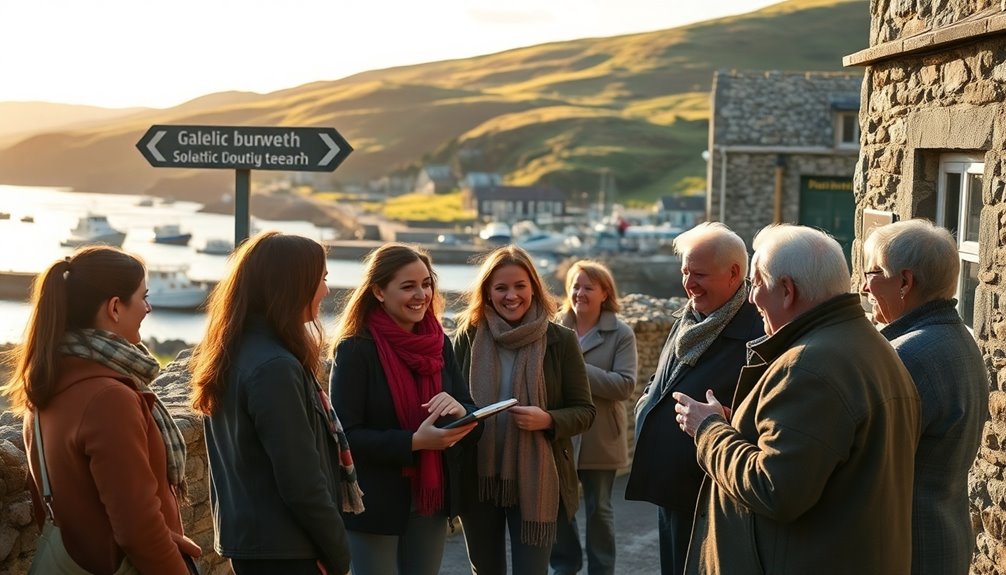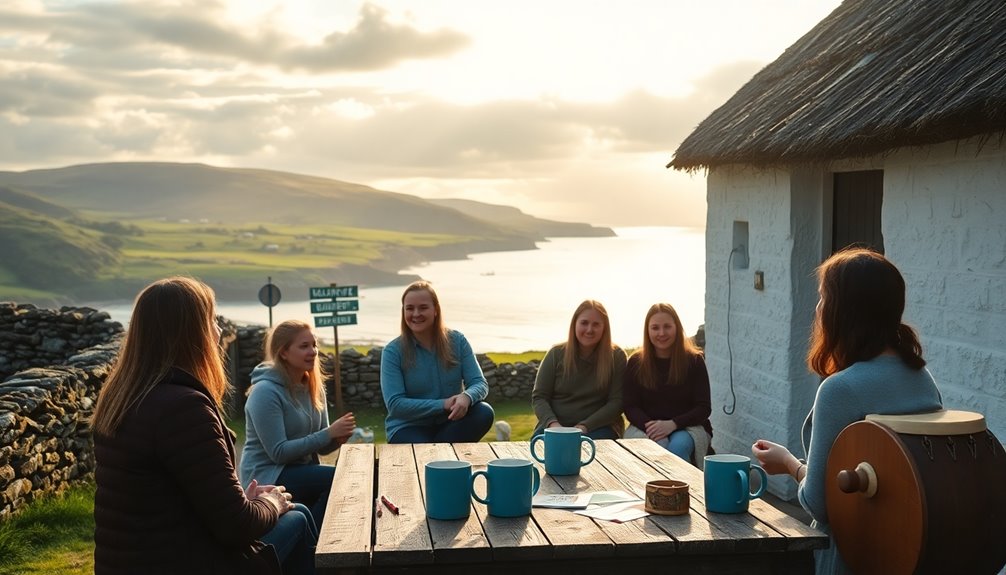
You’ll live with conversation-focused hosts who set gentle routines and correct you kindly, join university tandems for weekly practice and campus life immersion, assist as a volunteer teaching aide in community centres to use everyday Irish, help conserve heritage in museums while learning practical skills, or do work-exchange at youth hostels where chores and chats boost confidence. Each option balances safety, structure, and culture — keep going to uncover details and pick what fits you best.
Homestays With Conversation-Focused Hosts
When you step into a host family’s home in Ireland, you’ll immediately notice the rhythm of conversation—morning banter over tea, stories shared at the kitchen table, and the easy corrections that come wrapped in laughter; these are hosts who make language learning part of daily life. You’ll be welcomed into routines that feel safe and steady, where language exchange happens naturally: you try phrases, they listen, they gently correct, and you try again. Nights might bring quiet reading aloud or shared walks where you practice vocabulary in real settings. This cultural immersion is intentional but relaxed, designed to build confidence without pressure. Hosts often set clear boundaries and routines, so you know what to expect and can focus on speaking. You’ll leave with practical skills, new conversational habits, and an understanding of daily Irish life that classroom work rarely offers — all within a trusting, supportive home environment.
University Language Tandems and Exchange Programs
Because you’ll be surrounded by classmates who’re also traversing language learning, university tandems and exchange programs turn campus life into a living classroom: paired conversation partners, structured language labs, and informal meetups mean you’re practicing in lectures, cafeterias, and student pubs alike. You’ll notice how routines shape progress — weekly tandems where one hour is in English, the next in Irish — and how safe spaces emerge when schedules, mentors, and clear expectations are set. Language exchange here isn’t random; it’s facilitated, monitored, and often backed by student services that prioritize wellbeing. Cultural partnerships with local societies and visiting students let you test phrases in guided settings before trying them independently. You’ll gain confidence through small-group workshops, supervised conversation circles, and assessed progress that feels supportive rather than exposing. If you prefer predictable structure and campus safety, these programs offer consistent practice, friendly accountability, and clear pastoral care so you can focus on speaking, listening, and connecting without unnecessary risk.
Volunteer Teaching Assistants in Community Centers
Volunteer teaching assistant roles in community centers put you inside neighbourhood hubs where language learning happens amid everyday life — after-school clubs, senior meet-ups, and drop-in classes — so you’ll be practicing Gaeilge in practical, improvised moments as much as in planned lessons. You’ll arrive to warm greetings, quiet preparation, and a clear sense of routine that helps you settle in quickly. Observing a lead teacher, you’ll offer educational support: small-group activities, pronunciation practice, and gentle corrections that build confidence. Community engagement comes naturally — you’ll share stories, learn local phrases, and help plan simple cultural activities that feel safe and familiar. The work is hands-on but measured; supervisors set boundaries and resources are on hand, so you won’t be left guessing. Over time you’ll notice real progress in learners’ speech and in your own fluency, and you’ll carry the calm assurance that you’re contributing meaningfully while staying within a supported, respectful environment.
Cultural Conservation and Heritage Volunteering
If you want to help keep Ireland’s living history breathing, cultural conservation and heritage volunteering will place you in the thick of traditions, archives, and places that carry memory. You’ll work alongside careful professionals in museums, historic sites, and community projects, learning hands-on methods of cultural preservation while following clear safety protocols. Picture cataloguing fragile manuscripts with steady gloves, documenting oral histories in warm kitchens, or assisting with tactile conservation work under supervision — each task tuned to protect objects and people. You’ll also support heritage education programs that welcome visitors and local schools, using simple, accessible language to share stories and respect customs. Expect structured shifts, briefings, and mentorship so you feel confident and secure. The pace is thoughtful, the impact tangible: you leave projects better preserved and communities better equipped to pass on traditions. It’s a good fit if you want meaningful immersion without risk, rooted in care and shared responsibility.
Youth Hostels and Volunteer Work-Exchange Stays
While you’ll share dorms and dinner tables with travelers from all over, a work-exchange stay in an Irish hostel often feels more like joining a temporary household than simply booking a bed. You’ll arrive to clear instructions, a brief tour, and a roster outlining safe, manageable shifts—cleaning common rooms, helping in the kitchen, or leading simple youth engagement games. Days unfold with practical rhythms: morning chores, midday language practice over trade-for-meals, and evening hostel activities that build trust and conversation. You’ll notice how small acts—folding laundry, greeting newcomers, organizing a board game night—open chances to practice Irish and meet locals who recommend quiet walks and reliable transport. Hostels tend to prioritize your safety with secure lockers, well-lit common areas, and staff who mediate schedules and boundaries. If you want immersive, community-based language practice without sacrificing comfort, a work-exchange hostel stay can be steady, social, and reassuring.
Gaelic Language Immersion Camps and Programs

From the friendly bustle of a hostel you’ll often find a very different kind of immersion: small, focused Gaelic camps tucked into coastal villages or mountain hamlets where the language shapes the day. You arrive to a calm routine — breakfasts spoken in Irish, signage that gently nudges you to try phrases, and clear safety briefings so you always know where to be. Instructors lead gaelic language workshops that balance grammar with conversation, pairing you with local speakers for supported practice. Afternoons might offer guided walks where you’ll hear place-names explained, and evenings host traditional music immersion sessions that teach songs and offer a warm, communal way to use new vocabulary. Accommodation is usually simple and monitored; staff prioritize wellbeing and accessibility. You’ll leave with usable phrases, friendships rooted in shared learning, and confidence to continue practicing while traveling. These programs are steady, welcoming environments if you want focused, secure language growth.
Some Questions Answered
Do Volunteers Get Paid or Receive Stipends?
Mostly no, you won’t get a salary, though compensation structures vary and some programs offer modest stipends or room-and-board. You’ll find volunteer benefits like housing, meals, travel subsidies, language classes, and insurance in safer, well-run placements. You’ll want to ask about payment timelines, what’s covered, and emergency procedures. Observe contract details, note any hidden costs, and trust your instincts—pick programs that clearly list benefits and protections before you commit.
Are Visas or Special Permits Required for Volunteering?
Yes — you’ll usually need a visa or permit depending on your nationality and length of stay. You might suspect short tourist stays let you volunteer casually, but that theory’s risky: visa application rules and volunteer requirements often bar unpaid work on a visitor stamp. Check entry rules, get written confirmation from your host, and apply for the correct visa or permit. That keeps you safe, legal, and focused on the immersion experience.
Can Families With Children Participate in These Programs?
Yes — families can join many programs, and you’ll find family involvement is encouraged. You’ll notice child friendly activities are woven into daily routines: storytelling, crafts, nature walks and local school visits that feel safe and supervised. You’ll be matched with hosts or coordinators who prioritize accommodation, child safety, and clear schedules. You’ll feel reassured by background checks, references and organized group options that make it easy to volunteer together as a family.
What Level of Irish (Gaelic) Proficiency Is Required?
You’ll need very little to start, a bit to grow, and time to deepen. You’ll find programs that welcome beginner proficiency with basic phrases and patient tutors, and others that expect advanced immersion with fluent conversation and local work. You’ll be guided, monitored, and supported; you’ll be eased into classes, paired with mentors, and given safety briefings. You’ll always have options to progress at a steady, secure, respectful pace.
Are There Medical or Travel Insurance Requirements?
Yes — you’ll need adequate insurance coverage and proof of travel safety measures. You’ll want medical and travel insurance that covers emergency care, evacuation, and activity-related risks; check policy limits and exclusions. Bring documents, emergency contacts, and medication notes. Before you go, compare providers, register with your embassy, and keep digital copies of policies. That careful preparation helps you feel secure and focused on learning and volunteering.
Summing Everything Up
You came for flawless Gaeilge and left with mismatched tea cups and a pocketful of new idioms — how very convenient. You’ll think you were volunteering to help others, but they’ll end up teaching you the songs you can’t stop humming. You’ll arrive certain you’ll soak up grammar like a sponge, then find yourself laughing at a sign you can’t translate. That’s immersion: messy, generous, and exactly the point.
